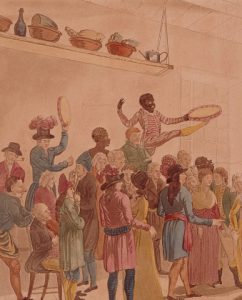Excerpted from: Charmaine A. Nelson,
Toppling the ‘Great White North’:
Tales of a Black Female Professor in Canadian Academia,” The Black Professoriat: Negotiating a Habitable Space eds. Sandra Jackson and Richard Gregory Johnson III (New York: Peter Lang, 2011), pp. 108-34.
In contrast to the USA where African-American and Black Studies programs, departments and institutes have proliferated since the latter half of the twentieth century (i), there is a decided absence of Black or African-Canadian Studies in Canadian academia. This academic absence has a direct impact on when, where, how, and how much, black-focused Canadian scholarship can be delivered in Canadian universities. Rather than departments with designated staff, or programs that can provide degree requirements, Canada’s paltry infrastructure of Black Canadian Studies usually takes the form of research centres or more insignificant or underfunded structures, many of which do not have stand-alone faculty or even access to knowledgeable professors that they can borrow from elsewhere on campus on a regular basis.
As such, while they have been exciting and impressive sites of academic conferences, public fora and even courses, they are not able to consistently offer enough credits in a timely fashion to allow students the option of a degree specialization, a minor, major or honours degree in Black Canadian Studies.
Therefore, questions remain about our existing programs and resources. What is their real material capacity for education in terms of professors, courses, resources, and curricular frameworks? In 2004, one hundred and forty (140) of the four hundred (400) Black Studies programs or departments in the USA offered undergraduate degrees, twenty-four (24) MA’s, and five (5) PhD’s. (ii) Comparably, within Canada’s few Black or African-Canadian academic resources (none of which are constituted as departments with a significant level of designated, full-time faculty) zero degrees were offered.

i. Jacqueline Bobo, Cynthia Hudley and Claudine Michel, “Introduction” The Black Studies Reader, Jacqueline Bobo, Cynthia Hudley and Claudine Michel eds. (New York: Routledge, 2004), pp. 1-2.
Bobo, Hudley and Michel trace the beginnings of Black Studies in US higher education to initiatives at Merritt Junior College in Oakland, California where a course entitled “Negro History” was proposed. Although it failed to meet the standards of Huey Newton and Bobby Seale, their organizing efforts led to the establishment of the Soul Students’ Advisory Council, an organization which provided a template for later Black Student unions.
ii. Jacqueline Bobo, Cynthia Hudley and Claudine Michel, “Introduction” The Black Studies Reader, Jacqueline Bobo, Cynthia Hudley and Claudine Michel eds. (New York: Routledge, 2004), p. 2.
